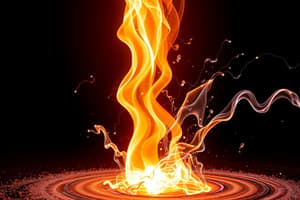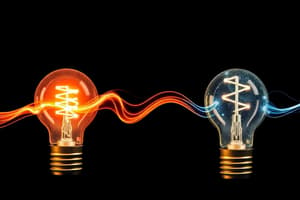Podcast
Questions and Answers
Which of the following statements best illustrates the First Law of Thermodynamics?
Which of the following statements best illustrates the First Law of Thermodynamics?
- Energy transformation is 100% efficient in all processes.
- In a closed system, the change in internal energy equals the heat added minus the work done. (correct)
- Energy can be created in a closed system.
- The total entropy of a system decreases over time.
Which energy source is classified as renewable?
Which energy source is classified as renewable?
- Natural gas
- Hydroelectric (correct)
- Coal
- Nuclear
What does the Second Law of Thermodynamics imply about energy transformations?
What does the Second Law of Thermodynamics imply about energy transformations?
- Some energy is always lost as heat in irreversible processes. (correct)
- Energy cannot be transformed from one form to another.
- Energy transformations are perfectly efficient without losses.
- All energy transformations are reversible.
Which statement about the Third Law of Thermodynamics is correct?
Which statement about the Third Law of Thermodynamics is correct?
Which of the following is a characteristic of non-renewable energy sources?
Which of the following is a characteristic of non-renewable energy sources?
Which formula correctly represents kinetic energy?
Which formula correctly represents kinetic energy?
What term describes the energy stored due to an object's position or configuration?
What term describes the energy stored due to an object's position or configuration?
In the conservation of energy, what happens to mechanical energy when transformed into thermal energy?
In the conservation of energy, what happens to mechanical energy when transformed into thermal energy?
Which unit of power is defined as one joule per second?
Which unit of power is defined as one joule per second?
Which form of energy is associated with the movement of electrons?
Which form of energy is associated with the movement of electrons?
What does the term 'work' specifically refer to in the context of physics?
What does the term 'work' specifically refer to in the context of physics?
What is the primary characteristic of nuclear energy?
What is the primary characteristic of nuclear energy?
Which equation is used to calculate gravitational potential energy?
Which equation is used to calculate gravitational potential energy?
Flashcards
Entropy
Entropy
The total disorder or randomness of a system. It always increases in an isolated system over time.
Heat
Heat
A measure of energy transfer due to a temperature difference.
First Law of Thermodynamics
First Law of Thermodynamics
Energy cannot be created or destroyed, only transformed from one form to another.
Renewable Energy
Renewable Energy
Signup and view all the flashcards
Non-renewable Energy
Non-renewable Energy
Signup and view all the flashcards
What is energy?
What is energy?
Signup and view all the flashcards
What is kinetic energy?
What is kinetic energy?
Signup and view all the flashcards
What is potential energy?
What is potential energy?
Signup and view all the flashcards
What is thermal energy?
What is thermal energy?
Signup and view all the flashcards
What is chemical energy?
What is chemical energy?
Signup and view all the flashcards
What is electrical energy?
What is electrical energy?
Signup and view all the flashcards
What is nuclear energy?
What is nuclear energy?
Signup and view all the flashcards
What does the law of conservation of energy state?
What does the law of conservation of energy state?
Signup and view all the flashcards
Study Notes
Fundamental Concepts of Energy
- Energy is the capacity to do work. It can exist in various forms, including kinetic (energy of motion), potential (stored energy), thermal (heat energy), chemical, electrical, and nuclear.
- The total energy of a closed system remains constant; this is the law of conservation of energy. Energy can be transformed from one form to another, but it cannot be created or destroyed.
- Energy is measured in joules (J) in the International System of Units (SI).
Types of Energy
- Kinetic Energy (KE): The energy an object possesses due to its motion. KE = 1/2 * m * v^2, where m is mass and v is velocity.
- Potential Energy (PE): Stored energy that an object possesses due to its position or configuration. Gravitational potential energy (PEg) is related to height: PEg = m * g * h, where g is the acceleration due to gravity and h is height. Elastic potential energy is associated with stretched or compressed objects.
- Thermal Energy: The internal energy of a substance due to the kinetic energy of its atoms or molecules. Heat is the transfer of thermal energy.
- Chemical Energy: Stored energy in the bonds of atoms and molecules within a substance. Released during chemical reactions.
- Electrical Energy: Energy carried by electric current. Associated with the movement of electrons.
- Nuclear Energy: Energy stored within the nucleus of an atom. Released in nuclear reactions like fission and fusion.
Energy Transformations and Work
- Work: Work is done when a force causes displacement. Work = force x distance x cos(θ), where θ is the angle between the force and the displacement.
- Energy can be transferred from one object to another through work. For example, a falling object transfers its gravitational potential energy to kinetic energy, and this kinetic energy can, in turn, do work on another object.
Power
- Power is the rate at which work is done or energy is transferred. Power = Work / Time = Energy / Time. The unit of power is the watt (W), which is equal to one joule per second (J/s).
Energy Conservation in Physical Systems
- The law of conservation of energy states that the total energy of an isolated system remains constant. Mechanical energy (potential + kinetic) can transform into other forms (e.g., thermal) in the process, but the overall energy sum stays the same.
Units of Energy
- The standard unit for energy in the International System of Units (SI) is the joule (J).
- Other units, such as the calorie (cal), kilocalorie (kcal), kilowatt-hour (kWh), and British thermal unit (BTU) are also used in various contexts.
Energy and Thermodynamics
- First Law of Thermodynamics: Energy cannot be created or destroyed, only transformed. In a closed system, the change in internal energy is equal to the heat added minus the work done.
- Second Law of Thermodynamics: The total entropy (disorder) of an isolated system can only increase over time. This means that energy transformations are not perfectly efficient. Some energy is always lost as heat in an irreversible process.
- Third Law of Thermodynamics: It is impossible to reach absolute zero temperature (0 Kelvin) in a finite number of steps.
Renewable and Non-Renewable Energy Sources
- Renewable energy sources are replenished naturally, such as solar, wind, hydroelectric, and geothermal energy.
- Non-renewable energy sources are finite and cannot be replaced in a short time frame, e.g., fossil fuels (coal, oil, natural gas).
Studying That Suits You
Use AI to generate personalized quizzes and flashcards to suit your learning preferences.




